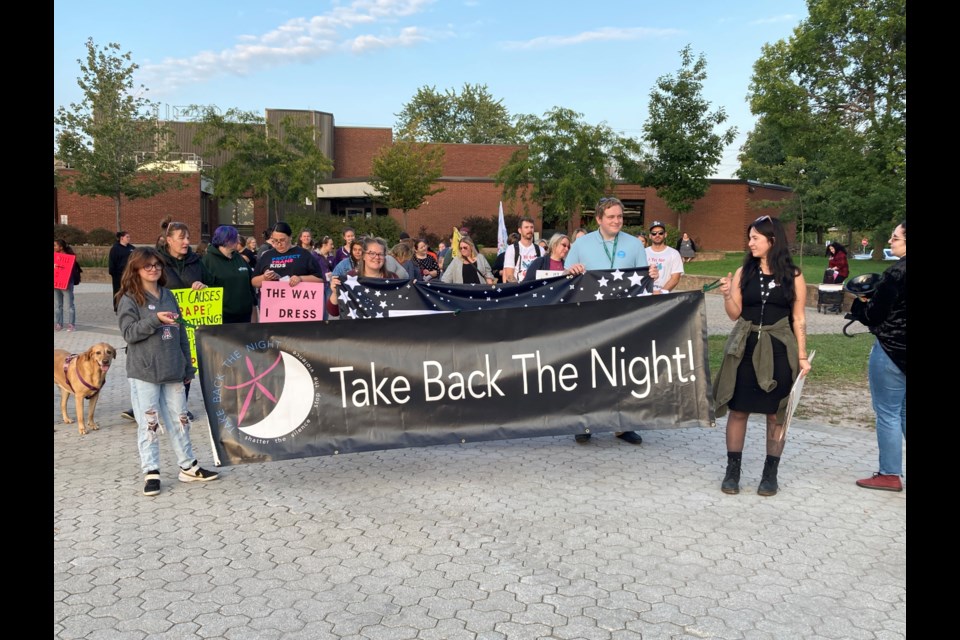“We have the power. We have the right. The streets are ours, take back the night.”
That was part of a chant repeated by the large group of mostly women, joined by men and children who walked through North Bay’s downtown during Thursday’s Take Back the Night march.
“People unite, take back the night.”
“What do we want? Safe streets. When do we want it? Now.”
The annual march was hosted by the Amelia Rising Sexual Violence Support Centre.
“Essentially, at the heart of it, it’s about community safety,” explained Natalie Austin, sexual violence prevention and education coordinator with Amelia Rising.
“It is about speaking out against street harassment, street violence and more within the past decade or so, it has really become more about gender-based violence.”
Last year Amelia Rising supported around 245 people through individual and group counselling and spent 65 hours on advocacy work for clients.
The first march in the United States is believed to have been held in the '70s to protest violence against women, particularly sexual assault.
“It was because in the '70s a lot of women were being assaulted and even murdered while out walking at night,” explained Austin.
One protest honoured the memory of a woman who was murdered while walking home from work.
“There was a microbiologist in San Francisco who had been stabbed and killed on a sidewalk at night. It is about making women and gender-diverse people feel safer walking at night. Currently, the experience of many women and gender-diverse people is that they feel unsafe walking at night. “
Anna Mary Campbell knew she wanted to add her voice to those across the community who wanted to make the streets safer for everyone.
“It’s incredibly important for me to be here today as a mom, as an educator, as a member of our community to remind people of the struggles women face, and people who experience gender-based violence face every day of their lives,” shared Campbell.
“And that’s men as well, of course. Gender-based violence is predatory violence where you’re taking advantage of a situation. The sign I’m carrying today says ‘I shouldn’t have to put my hair up to walk home.’
Campbell went on to explain the relevance of the sign based on her personal experiences in the service industry.
“As an 18-year-old server, one of the first items my manager told me was, ‘When you walk home after your shift at night, make sure you put your hair up because if not they’ll grab your ponytail from behind and assault you.’ So, you finish work, and you think I’m heading to university in a town I don’t know, and a community I don’t know and I’m having my supervisors and managers telling me how to be safe, walking home on the street. That was not here, but I have experienced similar things working in the service industry in North Bay,” shared Campbell.
“I have been assaulted within restaurants many times, customers groping, grabbing, and being young, looking young I got a lot of comments. It’s every day for us and I think it's something as a community and as a society, we need to be more aware of, and help make the changes that need to be made.”
Among the handful of men walking in solidarity with the women was John St. Amour, who was marching not only walking for a loved one, but for anyone feeling unsafe walking along city streets at night.
“I’m here to support my daughter. What is going on is totally against what I believe in. We need to see a lot of changes. This needs to be stopped and things dealt with instead of sweeping it under the bus,” said St. Amour.
It is a serious issue that doesn’t appear to be getting any better.
“Sexual violence and criminal harassment and other forms of gender-based violence, are violent crimes in Canada that are not declining. And that is from a Statistics Canada report,” Austin stated.
The event organizer went on to point out that not all incidences of sexual violence and harassment are reported to police.
“One in three women, one in six men, and one in two trans people. It’s important to remember with any kind of statistic, that they are under-reported. Only about ten per cent of assaults are actually reported to police,” noted Austin.
The evening began with an information fair, where various community organizations including Victim Services of Nipissing District, OUTLoud, and Amelia Rising were present to let people know what services are available in the community.
The opening ceremonies began with drumming followed by speeches and then the march.
“I want people to know that their community is standing up to say that they don’t support any kind of violence against people and that we’re really trying to put a focus on community safety, and improve on that.”
For this group, coming together to “Take Back the Night” was both powerful and impactful.
“It’s extremely important that we show up today just to tell people and show people that we’re here. That we’re not going to stand for gender-based violence. It needs to end. We need to stand up for ourselves collectively,” stated Aisha Bolus.
The loud but peaceful march moved slowly through the downtown, with people carrying handmade posters.
Their chant filled the nighttime air.
“The time is here; we won’t be controlled by fear. One, two, three four, we won’t take it anymore. Five, six, seven eight, no more violence, no more hate.”
